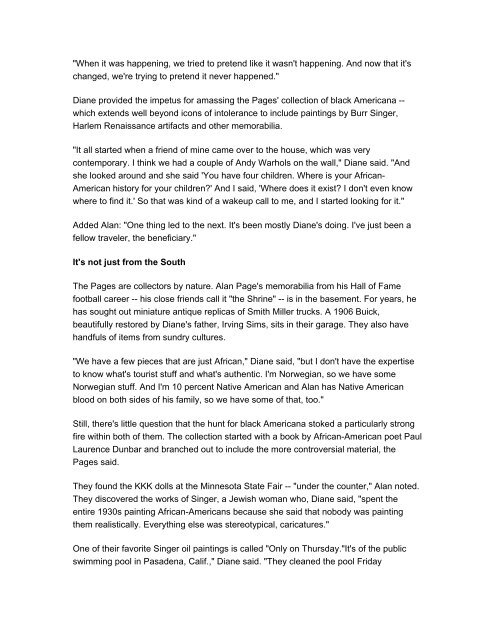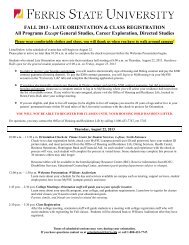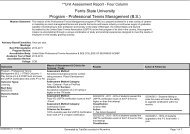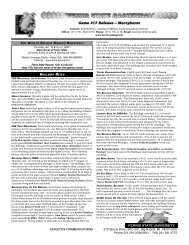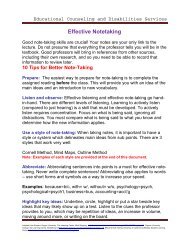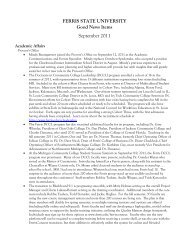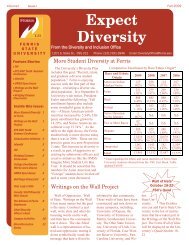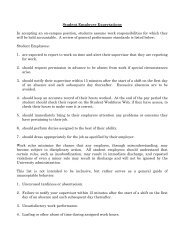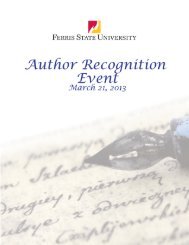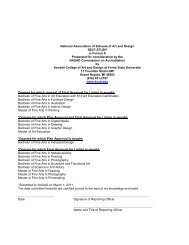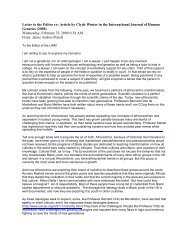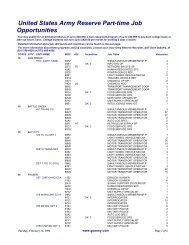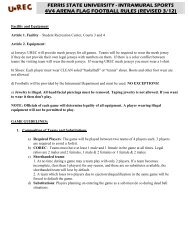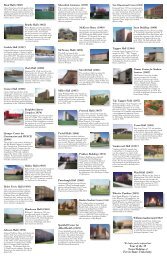Alan and Diane Sims Page - Ferris State University
Alan and Diane Sims Page - Ferris State University
Alan and Diane Sims Page - Ferris State University
Create successful ePaper yourself
Turn your PDF publications into a flip-book with our unique Google optimized e-Paper software.
"When it was happening, we tried to pretend like it wasn't happening. And now that it's<br />
changed, we're trying to pretend it never happened."<br />
<strong>Diane</strong> provided the impetus for amassing the <strong>Page</strong>s' collection of black Americana --<br />
which extends well beyond icons of intolerance to include paintings by Burr Singer,<br />
Harlem Renaissance artifacts <strong>and</strong> other memorabilia.<br />
"It all started when a friend of mine came over to the house, which was very<br />
contemporary. I think we had a couple of Andy Warhols on the wall," <strong>Diane</strong> said. "And<br />
she looked around <strong>and</strong> she said 'You have four children. Where is your African-<br />
American history for your children?' And I said, 'Where does it exist? I don't even know<br />
where to find it.' So that was kind of a wakeup call to me, <strong>and</strong> I started looking for it."<br />
Added <strong>Alan</strong>: "One thing led to the next. It's been mostly <strong>Diane</strong>'s doing. I've just been a<br />
fellow traveler, the beneficiary."<br />
It's not just from the South<br />
The <strong>Page</strong>s are collectors by nature. <strong>Alan</strong> <strong>Page</strong>'s memorabilia from his Hall of Fame<br />
football career -- his close friends call it "the Shrine" -- is in the basement. For years, he<br />
has sought out miniature antique replicas of Smith Miller trucks. A 1906 Buick,<br />
beautifully restored by <strong>Diane</strong>'s father, Irving <strong>Sims</strong>, sits in their garage. They also have<br />
h<strong>and</strong>fuls of items from sundry cultures.<br />
"We have a few pieces that are just African," <strong>Diane</strong> said, "but I don't have the expertise<br />
to know what's tourist stuff <strong>and</strong> what's authentic. I'm Norwegian, so we have some<br />
Norwegian stuff. And I'm 10 percent Native American <strong>and</strong> <strong>Alan</strong> has Native American<br />
blood on both sides of his family, so we have some of that, too."<br />
Still, there's little question that the hunt for black Americana stoked a particularly strong<br />
fire within both of them. The collection started with a book by African-American poet Paul<br />
Laurence Dunbar <strong>and</strong> branched out to include the more controversial material, the<br />
<strong>Page</strong>s said.<br />
They found the KKK dolls at the Minnesota <strong>State</strong> Fair -- "under the counter," <strong>Alan</strong> noted.<br />
They discovered the works of Singer, a Jewish woman who, <strong>Diane</strong> said, "spent the<br />
entire 1930s painting African-Americans because she said that nobody was painting<br />
them realistically. Everything else was stereotypical, caricatures."<br />
One of their favorite Singer oil paintings is called "Only on Thursday."It's of the public<br />
swimming pool in Pasadena, Calif.," <strong>Diane</strong> said. "They cleaned the pool Friday


